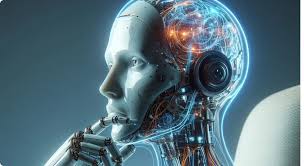How AI is Transforming Our World

Artificial intelligence (AI) is rapidly transforming every aspect of human life, from business and healthcare to education and entertainment. As AI technology advances, its impact on society continues to grow, creating new opportunities while also raising ethical and societal challenges.
In this article, we will explore the current state of AI, its key applications, the future of AI, and the implications it has for individuals, businesses, and governments worldwide.
1. Understanding Artificial Intelligence
What is AI?
Artificial Intelligence refers to computer systems designed to mimic human intelligence. AI enables machines to learn, reason, and make decisions, often improving over time through experience and data processing.
There are two main types of AI:
- Narrow AI (Weak AI): AI designed for specific tasks, such as virtual assistants (Siri, Alexa) or recommendation algorithms (Netflix, Spotify).
- General AI (Strong AI): A more advanced form of AI that can perform any intellectual task a human can do. General AI is still theoretical but is the long-term goal of AI research.
How AI Works
AI operates through various technologies, including:
- Machine Learning (ML): AI systems that improve performance by analyzing data and identifying patterns.
- Deep Learning: A subset of ML using neural networks to process vast amounts of data, powering technologies like facial recognition and self-driving cars.
- Natural Language Processing (NLP): AI that understands and generates human language (e.g., ChatGPT, Google Translate).
- Computer Vision: AI that interprets images and videos, enabling applications such as medical imaging and facial recognition.
2. AI’s Current Impact on Key Industries
AI is already revolutionizing various industries, enhancing efficiency and innovation.
A. AI in Healthcare
- Medical Diagnosis: AI can analyze medical scans and detect diseases like cancer earlier than human doctors.
- Drug Discovery: AI speeds up the process of developing new medicines.
- Robotic Surgery: AI-powered robots assist in precision surgeries, reducing human error.
- Personalized Treatment: AI analyzes genetic data to provide customized treatments for patients.
B. AI in Business and Finance
- Fraud Detection: AI detects suspicious financial transactions and prevents fraud.
- Automated Trading: AI-driven trading algorithms analyze market trends and make investment decisions.
- Customer Service: AI chatbots handle customer inquiries, improving response times and reducing costs.
- Supply Chain Optimization: AI predicts demand and optimizes logistics for companies like Amazon.
C. AI in Transportation
- Self-Driving Cars: Companies like Tesla and Waymo are developing AI-powered autonomous vehicles.
- Traffic Management: AI analyzes traffic patterns and optimizes city transportation.
- Drones and Delivery Robots: AI-powered drones are being used for deliveries and surveillance.
D. AI in Education
- Personalized Learning: AI tailors educational content to individual students’ needs.
- AI Tutors: Virtual tutors assist students in learning new subjects.
- Automated Grading: AI streamlines the grading process, allowing teachers to focus on teaching.
E. AI in Entertainment
- Content Recommendation: AI suggests movies, music, and books based on user preferences.
- Deepfake Technology: AI-generated videos are being used for creative and controversial purposes.
- Game Development: AI enhances video games by creating intelligent, adaptive characters.
3. The Future of AI: What’s Next?
AI is evolving rapidly, and the future holds exciting developments:
A. AI and the Workplace: Job Displacement vs. Job Creation
- AI will automate routine tasks, reducing the need for manual labor in industries like manufacturing and customer service.
- New jobs will emerge in AI-related fields, such as AI development, data science, and cybersecurity.
- Workers will need to reskill and adapt to AI-driven workplaces.
B. AI and Human-Level Intelligence
- Researchers are working towards Artificial General Intelligence (AGI)—AI that can think and reason like a human.
- AGI could lead to revolutionary breakthroughs but also poses risks if not properly controlled.
C. AI and Ethics: Challenges to Address
- Bias and Discrimination: AI can inherit biases from the data it is trained on, leading to unfair outcomes.
- Privacy Concerns: AI-powered surveillance and data collection raise concerns about individual privacy.
- Job Loss: Mass automation could lead to job displacement and economic inequality.
- AI Safety and Control: If AI becomes too advanced, ensuring that it aligns with human values will be critical.
D. AI and Human-AI Collaboration
- Future AI systems will likely enhance human capabilities rather than replace them.
- AI-powered exoskeletons and prosthetics will improve healthcare and physical abilities.
- AI co-pilots will assist professionals in fields like medicine, law, and engineering.
4. How Individuals and Businesses Can Prepare for an AI-Driven Future
A. Learning AI Skills
Individuals can future-proof their careers by:
- Learning AI-related skills such as machine learning, data analysis, and programming.
- Taking online AI courses from platforms like Coursera, Udacity, and edX.
B. Ethical AI Development
Businesses and governments should implement AI responsibly by:
- Ensuring transparency in AI decision-making.
- Reducing biases in AI systems.
- Establishing AI regulations to prevent misuse.
C. Investing in AI Technologies
Businesses can benefit from AI by:
- Automating repetitive tasks to improve efficiency.
- Using AI-driven data analytics for better decision-making.
- Exploring AI-driven innovations to stay ahead of competitors.
5. Conclusion: The Role of AI in Shaping Our Future
Artificial intelligence is transforming the world at an unprecedented pace, impacting industries, economies, and everyday life. While AI offers immense opportunities for innovation and progress, it also presents challenges that require careful management.
To thrive in an AI-driven world, individuals, businesses, and governments must embrace AI responsibly, invest in education and skills, and implement ethical policies. The future of AI is not about replacing humans but enhancing our abilities and improving the world we live in.
Are you ready for the AI revolution? Now is the time to learn, adapt, and harness AI’s potential for a smarter and more prosperous future.



